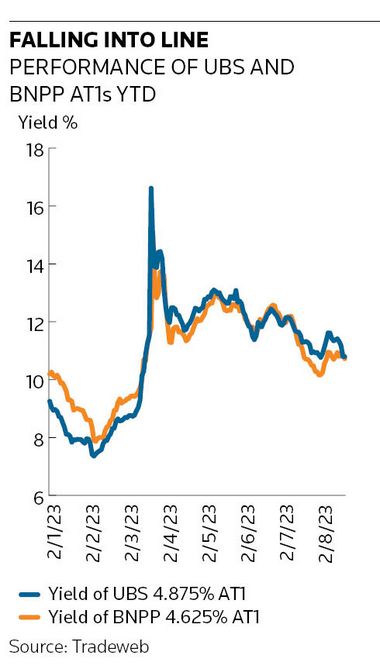UBS's chief executive has reiterated the importance of the Additional Tier 1 product to the Swiss bank and said it is watching the market carefully, but declined to comment on speculation that the lender could resume AT1 issuance in the near term.
UBS announced earnings on Thursday for the first time since completing its merger with Credit Suisse after delaying publication as it took its time to assess Credit Suisse's business and plot its integration.
In a call with analysts, UBS CEO Sergio Ermotti, was questioned on the bank's plans for AT1 capital, after Bloomberg reported on August 25 that the bank is exploring a return to the market.
Ermotti said AT1 continues to be an important part of the bank's capital stack and strategy but said he would not comment on the speculation.
“We are watching the market carefully and we will assess the timing and the need of tapping the market when appropriate. But, yes, of course we are looking at the AT1 market and we will make our consideration when appropriate," he said.
A first AT1 issuance from UBS following its rescue of Credit Suisse announced in March would be highly significant because holders of the latter's AT1s saw their investment controversially written down to zero in a move that sent shockwaves through the sector.
Capital need
Market participants had debated whether or not the post-merger UBS would have a significant AT1 capital need. But with so much related to the merger up in the air, onlookers have been forced to wait for the bank's fresh figures.
Prior to the second-quarter results, sources said UBS had received many questions from investors since the publication of the Bloomberg story and said its results would provide more clarity, although one suggested talk of an imminent return to the AT1 market was premature.
After the numbers were released on Thursday, Simon Adamson, chief executive and head of global financials research at CreditSights, said UBS may issue AT1 to support its going-concern leverage ratio, which was 5.56% at the end of June, providing a relatively thin 50bp of headroom above its minimum requirement. In contrast, the bank has 122bp of headroom above its minimum CET1 leverage ratio requirement.
"That suggests to us that UBS will be issuing AT1 securities before too long," he said.
Analysts also suggested the bank will be keen to maintain its investor-friendly policy of calling AT1s at the first opportunity.
"An extension of an AT1, after the merger was just so recently completed, would come with a clearly negative signalling effect, in our view, and we consider UBS will seek to call its AT1 at the first call date," wrote Suvi Platerink Kosonen, senior sector strategist for financials at ING.
UBS's next AT1 up for a call is a S$700m (US$518m) 5.875% transaction redeemable on November 28. After that is a US$2.5bn 7% note, callable in January.
"The fact that they are looking to issue further AT1s suggests that the next call will happen," said Filippo Alloatti, head of financials (credit) at Federated Hermes.
While market participants were trawling through UBS's earnings, the news came that Switzerland's Zuercher Kantonalbank will skip an upcoming AT1 call, instead extending its SFr750m (US$849.4m) bond in October. Bankers said, however, that there is little read-across between the two Swiss lenders.
A price to pay
Bankers have said that whenever UBS ultimately returns to the AT1 market, it will have to pay up. Many investors were burnt when Swiss regulator Finma wiped out Credit Suisse's AT1 stack, while still giving the bank's equity holders shares in UBS, in an inversion of the typical credit hierarchy.
The controversial move triggered a dramatic sell-off of the AT1 product. Although the broader market has since recovered, Swiss AT1s continue to underperform and bankers and investors say issuers will have to pay an additional premium to reflect the perceived riskiness of the Swiss version.
The most recent European AT1 issuance in the US dollar market – where UBS has issued most of its AT1s – was a US$1.5bn perpetual non-call five-year from BNP Paribas that priced in August at 8.50%. Such a coupon would be out of reach for UBS, said bankers.
UBS's last major currency AT1 issuance was a US$1.5bn 4.875% perpetual non-call February 2027 transaction, sold in January 2022.
A comparison with a US$1.25bn 4.625% AT1 also sold in January 2022 by BNP Paribas demonstrates how the saga has weighed on the Swiss sector.
At the start of this year, UBS's bond was trading at 9.22%, some 100bp inside the BNP Paribas comparable, according to Tradeweb figures. On Wednesday, before UBS released its results, its bond was bid at 11.10%, around 40bp wider than BNPP's.
However, UBS's AT1s performed strongly after the earnings report on Thursday. The US$1.5bn 4.875% note rallied by around 30bp to trade at 10.80% by Friday, erasing most of that pick-up.
Additional reporting by Alex Chambers
